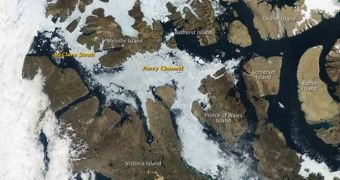In a development that could have serious implications on our planet's future, scientists announce that the multi-year ice that once adorned the North Pole is all but gone at this point. In its stead, seasonal ice, that freezes and then melts every year, seems to be the primary form of frozen water at the location. The meltdown could soon open up the legendary Northwest Passage that connects the Atlantis and Pacific Ocean, and could also increase sea levels considerably, affecting millions, Reuters reports.
“We are almost out of multi-year sea ice in the northern hemisphere,” David Barber, Canada's Research Chair in Arctic System Science at the University of Manitoba, explained to Parliament. The expert has just returned from an expedition in the northern Beaufort Sea. The perilous journey was meant to find a large ice pack made from older ice, but failed to find any such formation. According to the recent presentation, the only remaining chunks of permanent ice can be found around the Arctic archipelago, in Canada, over very narrow spreads of land.
The scientist's icebreaker encountered only what he termed “rotten ice” during the exploration, as in, ice no thicker than 50 centimeters (20 inches), laid atop very small chunks of older ice. “I've never seen anything like this in my 30 years of working in the high Arctic, it was very dramatic,” Barber said. “From a practical perspective, if you want to ship across the pole, you're concerned about multi-year sea ice. You're not concerned about this rotten stuff we were doing 13 knots through. It's easy to navigate through,” he added.
At this point, numerous experts in the international scientific community believe that the Arctic will lose all its ices by 2030 at the latest, which means that the North Pole will be nothing more than a cool sea within only two decades. If the total meltdown takes place, it would be for the first time in about a million years when the Pole is cleared of all its ice sheets. “I would argue that, from a practical perspective, we almost have a seasonally ice-free Arctic now, because multi-year sea ice is the barrier to the use and development of the Arctic,” Barber concluded.

 14 DAY TRIAL //
14 DAY TRIAL //